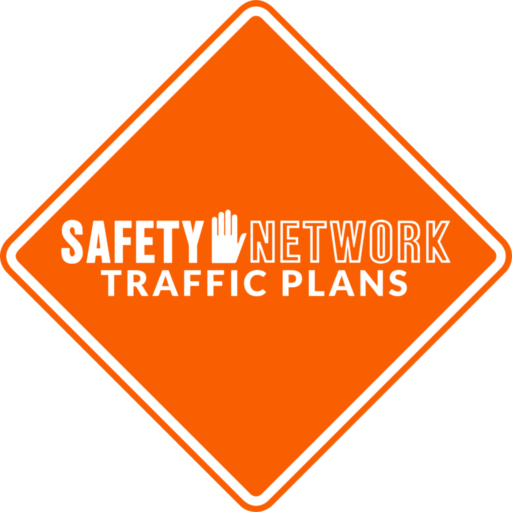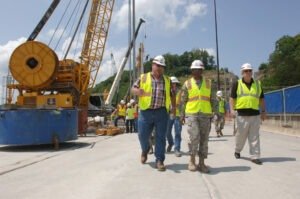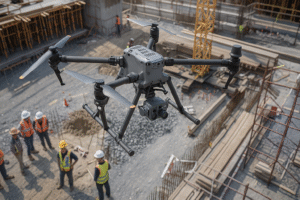Road construction projects are essential for improving infrastructure and ensuring safer driving conditions. However, they often come with traffic delays, which can disrupt commutes and affect overall traffic flow. At Safety Network Plans, we specialize in traffic control services designed to minimize these disruptions. In this article, we will discuss how to optimize lane closures with effective traffic control design and the strategies that Safety Network Plans uses to minimize disruption and improve safety.

1. Why Traffic Delays Occur During Road Construction
Traffic delays during road construction projects are common, but understanding the causes helps develop solutions. The most common reasons for delays include:
- Lane Closures: These reduce lanes available for traffic.
- Detours and Roadblocks: Detours add extra time to travel routes.
- Construction Equipment: Machinery can block lanes, forcing traffic to slow down or come to a complete stop.
- Inadequate Signage: Poorly placed signs confuse drivers, leading to delays.
- Why It Matters: Identifying the causes of traffic delays allows us to develop strategies to keep traffic moving smoothly. (Optimize Lane Closures)
- How It Helps: Addressing these factors helps construction projects move forward without causing major disruptions.
2. How to Minimize Traffic Delays During Construction Projects
Though some delays are inevitable, several actions can minimize disruptions. Here are some proven strategies:
2.1. Effective Traffic Control Plans
The most effective way to minimize delays is by implementing a detailed traffic control plan (TCP). This plan outlines lane closures, detours, signage, and the management of construction equipment.
- Why It Matters: A clear traffic control plan helps drivers navigate the construction zone smoothly.
- How It Helps: By providing clear instructions, a TCP ensures proper coordination and minimizes disruptions.
2.2. Use of Temporary Traffic Signals
Sometimes, temporary traffic signals can be more effective than flaggers in managing traffic flow. These signals can be programmed to control traffic through construction zones efficiently.
- Why It Matters: Traffic signals can manage vehicle flow better than flaggers, especially in busy areas.
- How It Helps: Automated signals ensure consistent control, reducing delays caused by human error.
2.3. Regular Traffic Updates and Communication
Keeping the public informed with real-time updates about road closures, detours, and changes in traffic patterns can help drivers avoid congested areas.
- Why It Matters: Providing timely information helps drivers plan alternative routes.
- How It Helps: It minimizes traffic entering construction zones, reducing overall delays.
2.4. Off-Peak Construction Hours
Performing construction work during off-peak hours or at night reduces the impact on traffic. While not always possible, this minimizes disruption during periods of heavy traffic.
- Why It Matters: Lane closures during peak hours increase congestion and frustration for drivers.
- How It Helps: Off-peak scheduling ensures that the majority of commuters aren’t impacted by lane closures, reducing overall delays.
2.5. Use of Temporary Barriers and K-Rails
Using temporary barriers such as water-filled K-rails can help keep traffic moving by ensuring drivers stay in their lanes and reduce accidents. These barriers help separate construction areas from active traffic.
- Why It Matters: Barriers provide a physical separation between construction zones and traffic, reducing the risk of accidents.
- How It Helps: The use of barriers improves safety by guiding traffic while maintaining a safe distance from the construction area, making lane closures less dangerous for both drivers and workers.
3. How Safety Network Plans Can Help Minimize Delays
At Safety Network Plans, we specialize in offering comprehensive traffic control services that reduce disruptions during road construction projects. Here’s how we assist with your project:
3.1. Expert Traffic Control Planning
We work with municipalities, contractors, and developers to create tailored traffic control plans. Our experienced team designs plans that optimize road conditions, traffic flow, and specific project needs.
- Why It Matters: A well-planned traffic control setup ensures smooth, efficient roadwork.
- How It Helps: Our plans reduce congestion, enhance safety, and keep your project on track.
3.2. Real-Time Traffic Management
We offer real-time traffic management services, including setting up temporary traffic signals and providing real-time updates to commuters. Our goal is to keep traffic flowing efficiently throughout your project.
- Why It Matters: Real-time management helps alleviate congestion and ensures traffic is constantly directed properly.
- How It Helps: Our services help minimize delays, ensuring projects are completed on time.
3.3. Full Compliance with Local Regulations
At Safety Network Plans, we ensure that all traffic control solutions comply with local traffic laws and safety standards. Our team stays updated on local regulations to maintain full compliance throughout the project.
- Why It Matters: Complying with regulations ensures that traffic control measures are effective and legally sound.
- How It Helps: We help you stay compliant, reducing the risk of fines or safety violations.
4. Why Choose Safety Network Plans for Your Traffic Control Needs?
When it comes to minimizing traffic delays, Safety Network Plans is the expert in the field. Here’s why we’re the best choice for your project:
- Experienced Team: With years of experience, our team specializes in designing and implementing effective traffic control strategies.
- Comprehensive Services: We offer a full range of services, from traffic planning to real-time management.
- State-of-the-Art Equipment: Our advanced technology ensures that traffic is controlled effectively with temporary barriers, traffic signals, and signage systems.
- Commitment to Safety: At Safety Network Plans, we prioritize safety and ensure work zones are equipped with the right tools for both worker and driver protection.
Conclusion
Lane closures are an inevitable part of road construction projects, but with the right traffic control design, you can minimize their impact. Effective planning, clear communication, and the use of technology can reduce traffic delays, enhance safety, and keep your project on schedule. At Safety Network Plans, we specialize in optimizing lane closures to ensure smooth operations for all roadwork projects. Contact us today to learn how we can help with your traffic control needs.
Contact Us
For expert traffic control services, contact Safety Network Plans:
- Phone: Call (559) 291-8000
- Email: help@safetynetworkplans.com
- Website: safetynetworkplans.com
- LinkedIn: Safety Network Plans on LinkedIn
- Facebook: Safety Network Plans on Facebook
- Pinterest: Safety Network Plans on Pinterest




